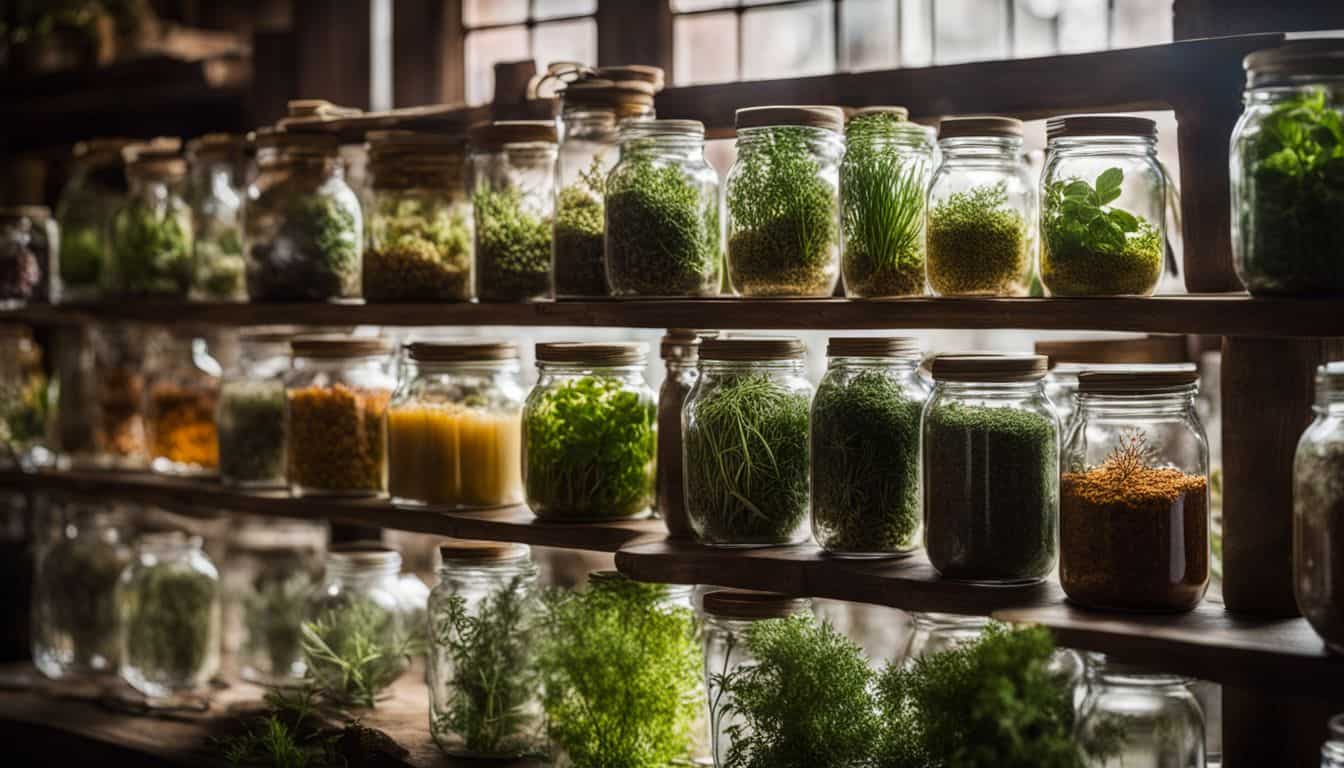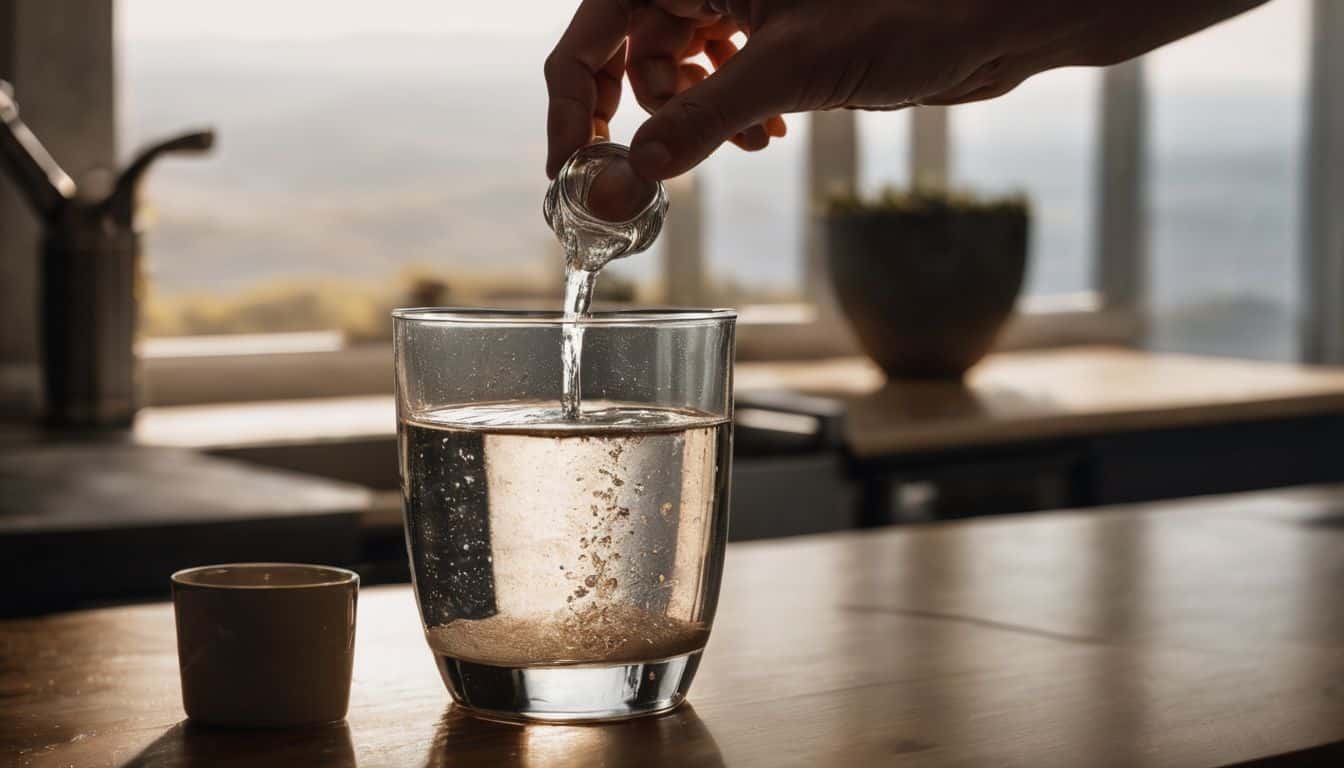Sometimes, don’t you just feel bombarded by the dizzying array of over-the-counter medications out there, each with its own laundry list of potential side effects? It can be enough to make your head spin! Trust me, I know how that feels.
That’s why I started on a quest for more natural alternatives. Lots of research and some trial-and-error later, herbal remedies emerged as a wonderful solution; they’re not just potentially great at addressing numerous health concerns but also help foster self-reliance when it comes to wellbeing.
In this blog post, we’re going to dive into 11 ways you can create your very own potent herbal remedies right in the comfort of your home. So are you ready to embark on this greener journey towards wellness?.
Key Takeaways
- Herbal medicine offers natural alternatives to over-the-counter medications and can support your overall health and well-being.
- You can create your own herbal remedies at home using safe and helpful herbs, such as those mentioned in the article.
- Growing your own herbs is a rewarding way to incorporate herbal remedies into your daily life, and it’s easier than you might think.
- Herbal teas, tinctures, poultices, and oils are common types of homemade herbal remedies that can nourish and heal your body.
- Healing herbs like Calendula, Chamomile, Echinacea, Lavender, Peppermint,
Understanding Herbal Medicine
Herbal medicine offers numerous benefits and can be a safe and natural way to support your health. Let’s explore the basics of homemade herbal remedies and how you can grow your own herbs for optimal wellness.
Benefits of herbal medicine
Herbal medicine can do a lot for your health. It uses plants to help fight sickness and keep you feeling great. Many people around the world trust in herbal medicine’s power. It has gained a lot of fans because it can make them feel better overall.
One huge plus is that these plants come right from nature, which means they are pure and safe when used correctly. Herbal medicine stands as a big part of healthcare that uses natural ways to heal you.
This kind of treatment might just be the perfect choice for you to stay healthy!
Safety considerations
Herbs can help us in many ways. But safety is a big deal. Some herbs may not be safe for everyone. They can cause bad things like allergies. Also, some herbs don’t mix well with drugs you might already take.
It’s key to make sure the herb quality is good too. Poor quality or false plants can lead to trouble. The wrong dose of an herb can also cause harm and side effects. Watching how your body reacts to herbs is important as well, especially when starting new ones.
Basics of Homemade Herbal Remedies
You can make your own herbal remedies at home. This is a good way to use what nature gives us for our health. First, find out which herbs are safe to use and helpful for you. The book “Sebi Book of herbal healing” has many ideas about this.
It even has 150 recipes! Some remedies might be teas or tinctures, others may be oils or salves.
Herbs need care as they grow, much like all plants do. You must give them water and light. When they are ready, pick them with care too. Dry the herbs well before using them in any remedy.
Making natural remedies feels good because it brings us close to earth’s gifts for health and healing.

Growing your own herbs
Growing your own herbs can be a rewarding and practical way to incorporate herbal remedies into your everyday life. Here are some important tips for successfully growing your own herbs:
- Choose the right location: Select an area in your garden that receives at least 6 hours of sunlight per day. Herbs thrive in well-drained soil, so make sure the area has good drainage.
- Start with easy-to-grow herbs: If you’re new to gardening, start with herbs that are known for their adaptability and resilience. Some beginner-friendly options include basil, mint, rosemary, and thyme.
- Consider container gardening: Don’t have a big garden? No problem! Many herbs can be grown in pots or containers on balconies or windowsills. This allows you to easily move them around and bring them indoors during colder months.
- Provide adequate water: Herbs generally prefer slightly dry conditions, but they still need regular watering to thrive. Water your herbs when the top inch of soil feels dry, but avoid overwatering as it can lead to root rot.
- Use organic fertilizers: Avoid using chemical-based fertilizers on your herbs as they can affect the quality of the plants and their medicinal properties. Opt for organic fertilizers like compost or natural seaweed extract instead.
- Harvest with care: To maximize the flavor and potency of your herbs, harvest them at their peak freshness. Snip off individual leaves or stems rather than uprooting the entire plant.
- Dry and store properly: Properly drying and storing your harvested herbs is essential for preserving their medicinal properties. Hang them upside down in a cool, dry place until they become crisp, then store them in airtight containers away from direct sunlight.
- Experiment with different varieties: There are countless varieties of each herb available, each with its unique flavors and benefits. Explore different types of basil, lavender, or chamomile to discover your favorites.
Common Herbal Remedies
Discover the power of herbal teas, tinctures, poultices, and oils – natural remedies that can nourish and heal your body. Explore the world of common herbal remedies and unlock their potential for optimal health.
Read more to learn how to incorporate them into your daily routine.
Herbal teas
Herbal teas can be a great way to support your health and well-being. Here are some key facts about herbal teas:
- Herbal teas, also known as tisanes, are made by infusing dried fruits, flowers, spices, or herbs in water.
- They contain bioactive compounds that have anti – inflammatory and antioxidant properties.
- Chamomile tea can help improve sleep quality and reduce anxiety.
- Peppermint tea is known for its soothing effects on the digestive system and can help relieve bloating and indigestion.
- Ginger tea has been used for centuries to ease nausea and promote digestion.
- Echinacea tea is often used to boost the immune system and prevent colds or flu.
- Lavender tea has calming properties that can help reduce stress and promote relaxation.
Herbal tinctures
Herbal tinctures are concentrated herbs soaked in alcohol.
Herbal poultices and compresses
Herbal poultices and compresses are key components of homemade herbal remedies that can be used for various health conditions. They have been used for centuries and are known for their healing properties. Here are some important facts to know about herbal poultices and compresses:
- Herbal poultices involve applying a mixture of crushed or ground herbs directly onto the skin to treat ailments.
- Compresses, on the other hand, use a liquid herbal infusion or decoction that is applied to a cloth and then placed on the affected area.
- Herbal poultices and compresses can be used to relieve pain, reduce inflammation, promote wound healing, and soothe skin conditions such as rashes or burns.
- Certain plants like Acorus calamus, Artemisia dracunculus, Butea monosperma, and Citrullus are often used in herbal poultices and compresses for the treatment of neuropathic pain.
- It’s important to note that when using herbs for poultices or compresses, you should be cautious about potential allergies or adverse reactions.
- Always consult with a healthcare professional before using herbal remedies, especially if you have any underlying medical conditions or are taking medications.
Herbal oils and salves
Herbal oils and salves are popular in homemade herbal remedies. They can be used in different ways and forms, like teas, essential oils, ointments, and salves.
- Herbal oils and salves offer a natural alternative to traditional medicine.
- They can be made from various medicinal herbs known for their healing properties.
- Herbal oils are typically used topically for massages or added to bathwater for relaxation.
- Salves are often used for soothing skin irritations and reducing inflammation.
- Homemade herbal oils and salves can be personalized to address specific ailments or conditions.
- Making your own herbal oils and salves allows you to control the ingredients and ensure their purity.
Healing Herbs to Have on Hand
Incorporate healing herbs like Calendula, Chamomile, Echinacea, Lavender, Peppermint, Turmeric, and Garlic into your herbal medicine arsenal for a thriving lifestyle.
Calendula
Calendula is a versatile plant with many healing properties. It’s easy to grow and can be used for various purposes, especially for wound healing and skin health. The flowers of calendula can be turned into infused oil, which is great for dry and irritated skin or as an ingredient in salve recipes.
Calendula has about 30 different uses, including treating acne and fighting off bacterial infections. Overall, it’s a powerful medicinal herb that you should definitely have on hand for your survival toolkit!
Chamomile
Chamomile is a wonderful herb to have on hand for homemade herbal remedies. It has been used for centuries by ancient civilizations like the Egyptians, Greeks, and Romans. Chamomile is well-known for its calming properties and is commonly used as a tea to promote relaxation and reduce anxiety in the United States.
In Europe, it is also known for its wound healing abilities and anti-inflammatory properties. Chamomile can help ease an upset stomach, heartburn, nausea, and vomiting due to its soothing effects on the digestive system.
The dried flowers of the chamomile plant are usually prepared as tea or herbal extracts. It contains angelic and tiglic acids that give it a warm, spicy odor and contribute to its sedative qualities.

Echinacea
Echinacea is a commonly used herbal remedy that offers many health benefits. It can help reduce inflammation and improve the function of our immune system. Echinacea is also great at clearing bacterial infections.
The different parts of the echinacea plant, like its leaves, flowers, and roots, can all be used for their medicinal properties. There are various species of echinacea, such as E. angustifolia, E.
purpurea, and E. pallida. So if you’re looking to have some healing herbs on hand for natural remedies, echinacea is definitely one to consider!
Lavender
Lavender is a wonderful herb to have on hand for its healing properties. It can help relieve stress and promote relaxation, making it great for those who are looking for natural remedies to reduce anxiety or find some calm in their lives.
Lavender has also been used for centuries in skincare products due to its ability to treat skin ailments like wounds, eczema, and acne. Its soothing properties make it an excellent choice for aromatherapy, providing peace and healing when used topically.
Additionally, lavender leaves have medicinal purposes and offer additional health benefits. So whether you’re looking for stress relief or want to take care of your skin naturally, lavender is definitely a herb you should consider having in your homemade herbal remedies collection!
Peppermint
Peppermint is a healing herb that I highly recommend having on hand. It’s actually a hybrid of spearmint and wild mint, and it has many medicinal properties. One great way to use peppermint is by making a cup of peppermint tea.
This tea can be really helpful for improving digestion and relieving symptoms like bloating and gas. Peppermint is also known for its analgesic properties, which means it can help alleviate migraines too.
So if you’re dealing with digestive issues or need some relief from migraines, give peppermint a try!
Turmeric
Turmeric is a spice that is commonly used in homemade herbal remedies. It has been used for centuries in Ayurvedic medicine, which is an ancient healing system from India. One of the main compounds found in turmeric is called curcumin, and it’s what gives turmeric its bright yellow color.
Curcumin has been studied for its many health benefits and has been found to have anti-inflammatory and antioxidant properties. This means that it can help reduce inflammation in the body and protect against cell damage caused by harmful molecules called free radicals.
Turmeric is also known for its immune-boosting effects, as it can strengthen and support a healthy immune system. In addition, turmeric has antibacterial properties, which means that it can help fight off harmful bacteria in the body.
Garlic
Garlic has been used for thousands of years because it is good for your health. It can help prevent infections and lower blood pressure. Garlic also has compounds that are good for your body.
Even though garlic doesn’t have a lot of calories, it is very nutritious. People often use garlic to help with problems in their heart or blood system. So, having some garlic on hand can be really useful!
Incorporating Herbs into Everyday Life
Cook with herbs to enhance the flavors of your meals, use them in homemade skincare products for a natural glow, and turn to herbal remedies for common ailments like colds and headaches.
Cooking with herbs
Cooking with herbs is a simple and enjoyable way to incorporate them into your everyday life. Here are some tips to get you started:
- Experiment with different seasonings: Use herbs like basil, cilantro, and thyme to add flavor and freshness to your meals.
- Get creative with spices: Spices like turmeric, cumin, and paprika can add depth and warmth to your dishes.
- Embrace aromatics: Garlic, onion, and ginger can enhance the taste of your food and provide added health benefits.
- Explore culinary techniques: Try infusing oils with herbs or making herb rubs for meats and vegetables.
- Make natural remedies: Many herbs have medicinal properties. For example, peppermint can soothe digestion issues while chamomile promotes relaxation.
- Enjoy the nutritional benefits: Herbs are packed with vitamins, minerals, and antioxidants that support overall health.
- Enhance flavors without adding calories: Using herbs instead of salt or sugar can help you cut down on unhealthy ingredients without sacrificing taste.
- Use fresh or dried herbs: Fresh herbs are best for recipes that require their vibrant flavors, while dried herbs work well in soups, stews, and marinades.
Using herbs for skincare
Using herbs for skincare can be a natural and effective way to improve the health and appearance of your skin. Here are some ways you can incorporate herbs into your skincare routine:
- Make herbal tea: Brew herbal teas using ingredients like chamomile, lavender, or green tea. These teas can be used as toners, facial mists, or rinses to soothe and nourish your skin.
- Create homemade herbal masks: Mix herbs like turmeric, aloe vera, or rose petals with honey or yogurt to make nourishing face masks. Apply them once a week for glowing and rejuvenated skin.
- Use herbal oils: Infuse herbs such as calendula or lavender in carrier oils like jojoba or coconut oil to create homemade herbal oils. These oils can be used for facial massage, moisturizing dry skin, or even as makeup removers.
- Soothe irritated skin: Use herbs like chamomile or calendula to make herbal compresses that can provide relief from skin irritations, inflammation, and redness.
- Incorporate herbs in bath rituals: Add dried herbs such as lavender or rosemary to your bathwater for a relaxing and aromatic experience that can help soothe both your body and mind.
- Make herbal scrubs: Mix ground herbs like rose petals, oats, or coffee grounds with a carrier oil or honey to create gentle exfoliating scrubs that remove dead skin cells and reveal smoother skin.
Herbal remedies for common ailments
Herbal remedies are a natural way to treat common ailments and promote overall wellness. Here are some effective herbal remedies you can try:
- Echinacea: This herb stimulates the immune system and helps with healing.
- Peppermint: Peppermint is great for soothing an upset stomach and relieving indigestion.
- Chamomile: Chamomile tea can help with relaxation and sleep, as well as ease anxiety and stress.
- Garlic: Garlic has antimicrobial properties that can help fight off colds and infections.
- Ginger: Ginger is known for its anti-inflammatory properties and can be used to relieve pain, nausea, and digestive issues.
- Turmeric: Turmeric has powerful antioxidant and anti-inflammatory effects, making it beneficial for arthritis and other inflammatory conditions.
- Calendula: Calendula is commonly used in skincare products to soothe skin irritations, rashes, and minor cuts or burns.
- Lavender: Lavender essential oil has calming properties that can help with insomnia, anxiety, and headaches.
- Stinging nettle: Stinging nettle is a natural antihistamine that can provide relief from seasonal allergies.
- Lemon balm: Lemon balm tea is often used to reduce stress, anxiety, and promote relaxation.
Harvesting and Storing Herbs
Harvest herbs when they are at their peak potency by picking the leaves and flowers in the morning after the dew has dried.
When to harvest
Harvesting herbs at the right time is crucial to ensure their optimal flavor and potency. For leafy herbs like basil or mint, it’s best to harvest them before they start flowering.
This way, you can enjoy a continuous supply of fresh leaves throughout the growing season. On the other hand, if you’re looking for maximum oil concentration and flavor, wait until herb flowers appear before harvesting.
Harvesting after flowering ensures that you capture all those aromatic oils and intense flavors. Remember to cut your herbs using a sharp knife or scissors just above a pair of healthy leaves or nodes to encourage further growth.
Drying herbs
Drying herbs is an important step in preserving their flavors and medicinal properties. Here are some methods for drying herbs:
- Air-drying: Tie small bunches of herbs together and hang them upside down in a warm, dry place. Make sure the leaves are not touching each other to prevent mold growth.
- Seed harvesting: If you want to collect seeds from your herbs, let the flowers bloom and mature on the plant. Once they turn brown and dry, cut the stems and place them in a paper bag. Shake the bag gently to release the seeds.
- Using a dehydrator: If you have a food dehydrator, spread your herbs in a single layer on the trays. Set the temperature to around 95°F (35°C) and let them dry until crisp.
- Microwave drying: Place washed and thoroughly dried herb leaves between two paper towels or microwave-safe plates. Microwave them on low power for short intervals until they become brittle.
Storing herbs
After harvesting herbs, it’s important to store them properly so they can retain their essential oils and flavors for a long time. One common method is freezing the herbs, which helps preserve their freshness.
Another option is refrigeration, especially for tougher herbs like rosemary and thyme. You can also store these hardy herbs in a slightly damp container to keep them hydrated. If you prefer traditional methods, drying the herbs by hanging them upside down in a well-ventilated area works too.
This way, your stored herbs will be ready to use whenever you need them for cooking or medicinal purposes.
Herbal Recipes and DIY Projects
Learn how to create your own herbal tea blends, homemade tinctures, and soothing skincare products using natural ingredients from your garden. Discover the joy of DIY herbal remedies and unleash your creativity in this exciting chapter!
Herbal tea blends
Herbal tea blends are a great way to enjoy the health benefits of herbs. Here are some of my favorite blends to try:
- Rooibos and chamomile blend: This soothing blend is perfect for relaxation and promoting better sleep.
- Peppermint and tulsi blend: Refreshing and invigorating, this blend helps with digestion and provides a natural energy boost.
- Lavender and lemon balm blend: A calming combination that aids in stress relief and promotes mental clarity.
- Ginger and turmeric blend: Known for their anti-inflammatory properties, this blend can help with joint pain and boost the immune system.
- Hibiscus and rosehip blend: Packed with antioxidants, this blend supports heart health and boosts the immune system.
- Lemon verbena and lemongrass blend: Citrusy and refreshing, this blend aids in digestion and provides a natural detox for the body.
- Nettle leaf and dandelion root blend: These herbs support liver function, promote healthy skin, and act as natural diuretics.
- Elderflower and echinacea blend: Boost your immune system with this powerful combination that helps fight off colds and flu.
- Cinnamon and cardamom blend: This warming blend is perfect for winter months, aiding in circulation and digestion.
Homemade herbal tinctures
I love making homemade herbal tinctures because they are natural remedies that can help with various ailments. With homemade tinctures, I have control over the ingredients and the quality of the product. Here are some types of herbal tinctures you can easily make at home using fresh or dried herbs:
- Herbal teas: Steep herbs in hot water to make soothing and healing teas.
- Infusions: Soak herbs in a carrier oil like olive oil or coconut oil to create herbal-infused oils for skincare.
- Salves: Combine infused oils with beeswax to make healing salves for cuts, bruises, and rashes.
- Ointments: Mix herbs with petroleum jelly to create balms for skin irritations and dryness.
- Vinegars: Combine herbs with apple cider vinegar for use as a hair rinse or a facial toner.
Herbal skincare products
One of the exciting aspects of herbal medicine is its potential for improving our skincare routine. Here are some herbal skincare products that you can easily make at home:
- Herbal face wash: Mix dried herbs like chamomile and lavender with gentle liquid castile soap for a soothing and cleansing face wash.
- Herbal toner: Make a refreshing toner by steeping herbs like rose petals and witch hazel in distilled water. This can help balance your skin’s pH and tighten pores.
- Herbal face mask: Create a rejuvenating face mask by blending herbs like clay, turmeric, and rosemary with honey or yogurt. Apply this mixture to your face and let it sit for 15-20 minutes before rinsing off.
- Herbal body scrub: Combine dried herbs like calendula, lavender, and oatmeal with sugar or salt and nourishing oils to create an exfoliating body scrub that will leave your skin feeling soft and smooth.
- Herbal lip balm: Infuse herbs like mint or chamomile into beeswax or coconut oil to make a natural lip balm that moisturizes and protects your lips.
Herbal remedies for cold and flu season
During the cold and flu season, herbal remedies can help support your immune system and soothe symptoms. Here are some natural remedies to try:
- Echinacea: This herb is known for its immune-boosting properties and may reduce the duration and severity of colds and flu.
- Elderberry: Elderberry has antiviral effects and can help relieve symptoms like cough, congestion, and fever.
- Honey: Adding honey to warm herbal teas can soothe a sore throat and provide relief from coughs.
- Garlic: Garlic has antimicrobial properties that may help fight off colds and flu. You can add it to your food or take garlic supplements.
- Astragalus: This herb is an adaptogen that helps support the immune system. It may also reduce the frequency of respiratory infections.
Herbal Remedies for Stress and Mental Health
Discover the power of adaptogenic herbs, relaxation teas, aromatherapy with herbs, and herbal remedies for insomnia and anxiety to find natural relief for stress and boost your mental well-being.
Adaptogenic herbs
I’m excited to talk about adaptogenic herbs because they can really help us deal with stress. These special herbs, like tulsi, ashwagandha, rhodiola, passionflower, and lavender, have amazing properties that counteract the effects of stress in our bodies.
They help us adapt to stress more effectively and promote overall well-being. Adaptogens are associated with strength, stamina, and relief from fatigue. So if you’re feeling stressed or overwhelmed, incorporating adaptogenic herbs into your daily routine might just be the natural solution you’ve been looking for!
Relaxation teas
Relaxation teas are a great way to reduce stress and promote mental health. They can help you relax, unwind, and improve your sleep quality. Here are some herbal teas that can bring calmness to your life:
- Lavender Tea: Lavender flowers have soothing properties that can relieve mental stress and exhaustion. Brew a cup of lavender tea before bed to help you relax and sleep better.
- Chamomile Tea: Chamomile is known for its calming effects. This herbal tea can reduce anxiety and promote relaxation when sipped in the evening or before bedtime.
- Lemon Balm Tea: Lemon balm has been used for centuries to reduce anxiety and promote relaxation. Enjoy a cup of lemon balm tea during stressful times or when you need a moment of calm.
- Peppermint Tea: Peppermint tea not only has a refreshing taste but also helps relax muscles and relieve tension. It’s great for unwinding after a long day.
- Valerian Root Tea: Valerian root is often used as a natural remedy for insomnia and anxiety. It can help you achieve a deep and restful sleep.
Aromatherapy with herbs
Aromatherapy with herbs is a natural way to reduce stress and improve mental health. Here are some herbs that can be used in aromatherapy:
- Lavender: Lavender is a popular herb known for its calming properties. It can help relieve insomnia, anxiety, and stress.
- Hops: Hops are commonly used in beer brewing but they also have sedative effects that can promote relaxation and better sleep.
- Maypop: Maypop, also known as passionflower, has been shown to reduce anxiety and improve sleep quality.
- Lemon balm: Lemon balm has a soothing effect on the nervous system and can help alleviate anxiety and improve mood.
- Valerian: Valerian root is often used as a sleep aid due to its sedative properties. It can help promote relaxation and reduce insomnia.
Herbal remedies for insomnia and anxiety
If you’re struggling with insomnia and anxiety, there are herbal remedies that can help. Here are some options to consider:
- Ginseng: This herb has been found to have potential benefits for mental disorders associated with stress.
- Lavender, hops, maypop, lemon balm, and valerian: These herbs have shown promise in relieving mild forms of neurological conditions like anxiety and depression.
- Lemon balm: It can be used for anxiety, sleep problems, heavy periods, and period pain.
- Chamomile, lavender, and valerian: These herbs are known for their calming properties and can be used as natural remedies for sleep and relaxation.
- Valerian: For centuries, valerian has been used to ease insomnia, anxiety, and nervous restlessness.
- Kava, passionflower, and chamomile: Clinical trials have shown these herbs to have potential in reducing anxiety.
Herbal Remedies for Digestive Health
Discover the power of digestive herbal teas, soothing herbal bitters, and effective remedies for indigestion and bloating.
Digestive herbal teas
Digestive herbal teas can provide relief from constipation, ulcers, and indigestion. Peppermint tea is known for its refreshing taste and has digestive health benefits. Ginger tea can promote efficient digestion and relieve nausea. Chamomile, vanilla, turmeric, and fruit essence teas support digestion and are naturally caffeine-free. Ashwagandha, echinacea, garlic, ginkgo, ginseng, and lavender are some of the best herbs for gut health. The use of herbal medicines is growing, but safety monitoring and consideration of adverse reactions is important.
Herbal bitters
Herbal bitters are commonly used in traditional Chinese medicine and Ayurveda medicine. These bitter herbs have a history of soothing occasional gas and bloating, relieving nausea and heartburn, and promoting digestive health. They have been growing in popularity as more people turn to natural remedies for their stomach issues. However, it’s important to be aware of the safety concerns surrounding herbal medicines, including digestive bitters. Monitoring the side effects and effectiveness of these remedies is crucial. One specific bitter herb called prickly ash is known for its digestive stimulating properties and may provide relief for indigestion.
Herbal remedies for indigestion and bloating
I’ve got some great herbal remedies to help with indigestion and bloating. Check them out:
- Ginger: It can naturally reduce stomach acid and ease indigestion.
- Triphala: This herbal remedy is known for its ability to alleviate gastrointestinal distress, including bloating and constipation.
- Lemon balm: When combined with other herbs, lemon balm may help treat indigestion and provide relief.
- Catnip and fennel: These herbs have been reported to aid in digestion and relieve heartburn.
- Marshmallow root: It can soothe the digestive tract and reduce inflammation, which may help with bloating.
- Papaya tea: This tea has digestive enzymes that can promote better digestion and reduce bloating.
- Peppermint oil (enteric-coated): It can eliminate unfriendly bacteria in the small intestine and support the growth of beneficial bacteria.
Conclusion on Homemade Herbal Remedies
In conclusion, by growing your own herbs and making homemade herbal remedies, you can thrive in a natural and holistic way. With the 11 ways outlined in this article, you have the tools to harness the healing power of plants for optimal health.
So go ahead, explore the world of herbal medicine and discover the benefits it has to offer.
FAQs on Homemade Herbal Remedies
1. Are homemade herbal remedies safe to use?
Yes, when used properly and in moderation, homemade herbal remedies can be safe and effective for various health issues.
2. How do I make a homemade herbal remedy?
To make a homemade herbal remedy, you can steep herbs in hot water to make tea, create poultices by applying crushed herbs to the skin, or infuse herbs in oil or alcohol for topical use.
3. Can I use homemade herbal remedies alongside prescribed medications?
It’s important to consult with a healthcare professional before using homemade herbal remedies alongside prescribed medications as they may interact or have unintended effects.
4. What are some common ailments that can be treated with homemade herbal remedies?
Homemade herbal remedies can help alleviate symptoms of common ailments such as headaches, digestive issues, colds and coughs, minor wounds or burns, and stress-related conditions.
5. Where can I find reliable information about specific herbs and their uses?
Reliable information about specific herbs and their uses can be found from reputable sources such as books on traditional medicine practices or through consultations with experienced herbalists or naturopathic doctors.





Leave a Reply